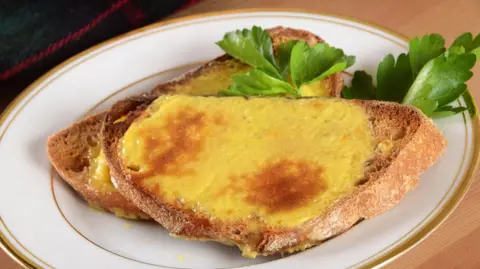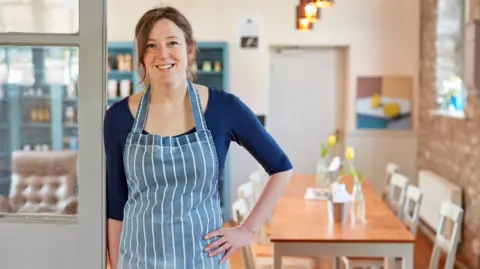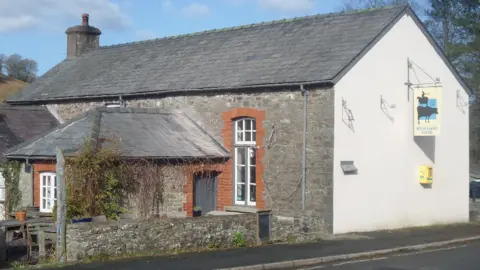
 Getty Images
Getty Images
Welsh rarebit is a popular Welsh dish that consists of toasted bread covered in a seasoned cheese sauce
It's a beloved national dish of Wales and is found on restaurant menus across the country, but did Welsh rarebit actually start life as a joke played by the English?
Toasted bread smothered in a rich, cheesy sauce - what's not to love?
But the origin stories of this nostalgic comfort food are as varied as the recipes you can use to make it.
Some credit poor farmers using a clever substitute for meat while others think English pubs coined the name as a joke, mocking the Welsh for not affording real rabbit.
But which of these cheesy tales cuts the mustard?
Welsh food historian and author Carwyn Graves said rarebit was "clearly associated with cultural and ethnic Welshness", with cheese being a vital part of European diets for a long time, especially in regions like Wales, where the dairy industry thrived.
In the Middle Ages, before refrigeration, cheese and butter were essential for preserving milk from the spring and summer for use during the colder months.
It was also a vital source of protein for poorer communities, particularly in areas like Wales and the Alps, where meat was scarce.
In Wales, melted or roasted cheese became popular across all social classes, eventually evolving into Welsh rarebit.
The 1536 Act of Union, incorporating Wales into England, saw Welsh migrants bringing melted cheese dishes to English cities.
Mr Graves said the English saw it as an ethnic curiosity, even joking about it.
One 16th Century tale sees Saint Peter trick Welshmen with the call caws bobi - Welsh for roasted cheese - which he said reflected the dish's cultural ties to Wales.
The name Welsh rarebit appeared much later, with early English cookbooks, such as Hannah Glasse's in 1747, using terms including Welsh rabbit and Scotch rabbit for similar cheese on toast recipes.
However, Mr Graves said there was no historical evidence linking the name to actual rabbits and he said the theory that poor people couldn't afford rabbit meat and used cheese instead was unproven.

 Carwyn Graves
Carwyn Graves
Welsh food historian, Carwyn Graves says Welsh rarebit dates back to medieval times
Kacie, from The Rare Welsh Bit food blog said Welsh rarebit, also known as Welsh rabbit, originated in the 1500s as a popular dish among Welsh working-class families who couldn't afford meat like rabbit, using cheese on toast as a substitute.
According to her, the dish was first recorded in 1725 and over time, the name shifted from Welsh rabbit to Welsh rarebit, possibly to move away "from patronising connotations associated with the nature of the dish as a poor man's supper".
Katrina from Real Girls Travel explained "nobody's quite sure how the name came about", but it's generally believed "Welsh rarebit" likely began as a joke about the poor people of south Wales, who were thought to live on rabbit and ale.
She added that many mistakenly think Welsh rarebit contains rabbit because the dish was originally called "Welsh rabbit" in 1725.
According to Katrina, the name probably changed because, in the late 17th and early 18th centuries, the English often gave humorous or fanciful names to regional foods, making the change "an attempt to make it a more fitting dish".
"I personally think it was a language barrier or a strong Welsh accent that gave the dish its name," she added.
In Sarah Fritsche's blog the Cheese Professor, she explained the word "Welsh" was used as an insult in 1700s Britain, similar to how "welch" functioned as a pejorative.
According to Ms Fritsche, "rabbit" was used humorously because only the wealthy could afford real rabbit, making the cheesy toast a "poor person's substitute".
She added "rarebit" was a corruption of "rabbit" and is unique to this dish, first appearing as "rare bit".

 Rose Geraedts
Rose Geraedts
Rose Geraedts says people love her Welsh rarebit dishes as they are "nostalgic"
Rose Geraedts, originally from the Netherlands, has lived in Brecon, Powys, for 20 years and runs the International Welsh Rarebit Centre.
She opened the business eight years ago after noticing cafes and pubs in the area were not serving it, despite high demand from tourists.
"I thought it was crazy that a national dish wasn't on the menu. I think many saw it as old-fashioned," she said.
She took over a disused Victorian school building, renovated it and made Welsh rarebit the star of the show.
"It seemed mad not to do it - but a lot of people think I'm nuts," she added.
The cafe now offers six varieties and Ms Geraedts said customers loved the dish's rich, comforting flavour, seasoned with cayenne pepper, nutmeg, paprika and Worcestershire sauce.

 Rose Geraedts
Rose Geraedts
Ms Geraedts has welcomed visitors from around the world to her Welsh Rarebit Centre
Ms Geraedts said she had welcomed visitors from around the world, from Australia to America, and even served celebrities including Jonathan Ross and rugby legend Gareth Edwards.
She added: "People love it because it's nostalgic. They remember their mother or grandmother making it.
"It's much more than just dry cheese on toast."
Ms Geraedts believes rarebit became popular due to Wales' connection to cheese-making, despite its name being a sarcastic "patronising" English joke.

 Beca Lyne-Pirkis
Beca Lyne-Pirkis
Chef, Beca Lyne-Pirkis says she first learned to make Welsh rarebit with her grandparents, and therefore it brings back "nostalgic memories"
University lecturer, dietician, cook and food writer Beca Lyne-Pirkis said she first learned to make Welsh rarebit with her grandparents so it brings back "nostalgic memories".
The 43-year-old, from Cardiff, said it was a great first dish to learn as it's "more complicated than cheese on toast" but not too difficult.
Ms Lyne-Pirkis said she has two versions - a rich, roux-based recipe with cheddar, beer, mustard and Worcestershire sauce and a quicker one mixing egg, cheese, and seasoning to spread on toast.
The dish stayed with her through her university years and is now a favourite with her children.
"I fell in love with the flavour," she said.
"When I eat it I get the nostalgic childhood feeling as I have so many fond memories of eating it. That's where my love of food came from."
Whatever the roots, Ms Lyne-Pirkis said rarebit was now a timeless, adaptable national dish rooted in family stories and experimentation.
"Every recipe has its own story, which helps keep the recipe alive."

 3 months ago
84
3 months ago
84

















































